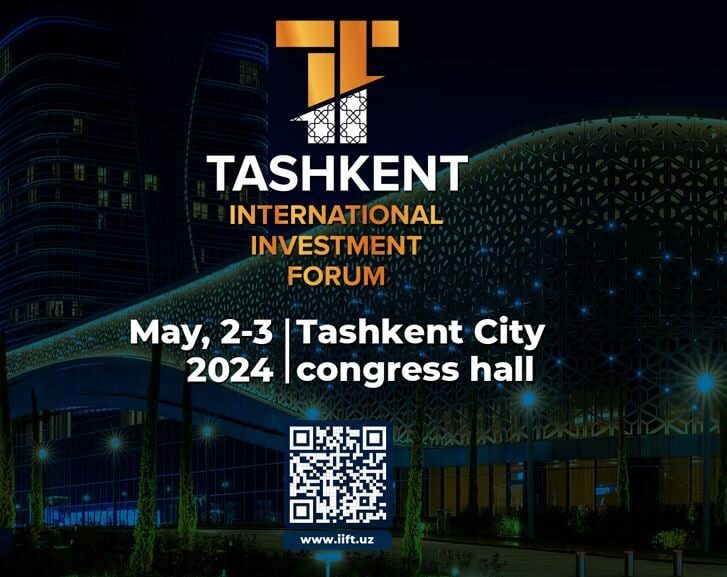
By: Dr. Mahmud Ul Hassan
The visionary leadership of Uzbekistan President Shavkat Mirziyoyev has turned the Tashkent International Investment Forum into a big success story attracting more and more inflows of Foreign Direct Investments (FDIs) in the country boosting its industrial base, pace of modernization, green transformation, economic liberalization, international cooperation and last but not least human capital. The TIIF-2024 received 2,500 foreign guests from 93 countries.
Actually, the series of structural reforms has transformed Uzbekistan as the hottest destination of FDIs, joint ventures, industrial cooperation, banking & finance integration and more and more export oriented policies in Central Asia and beyond in which Head of the state’s diplomacy played an important role.
Resultantly, the foreign investment inflows into Uzbekistan has reached and topped US$60bn in recent years which is indeed a great omen for the macro-economy of Uzbekistan.
While delivering a keynote speech in the “TIIF-2024” Uzbek President Mirziyoyev pointed out that US$14bn received from international financial institutions (IFIs) for critical social and infrastructure development. By showcasing the real essence of the Uzbek macro-economy which has grown by almost two times, the president upholds the economic diversification, political dynamics and social and diplomatic determination of his country.
The latest data confirmed GDP growth at 6 percent and drop of Inflation to 9 percent showing quick economic recovery and immense socio-economic stability and sustainability. Thus trade turnover indicators, and the foreign exchange market and gold currency reserves remained stable and sustainable.
During his remarkable speech the President appreciated the launch of more than 300 investment and industrial projects with international multinational companies such as ACWA Power, Masdar, Total Eren, Voltalia, Calik and Aksa in the energy sector; Air Products, Indorama and CAMCE in the chemical industry; Orano and DANIELI in the mining and metallurgical industry; BYD, Kia and Samsung in the automotive and electrical engineering; and KOC, KNAUF in the construction industry which vividly reflected economic vibrancy, diversification and real strength of its national economy.
This global cooperation and partnerships created hundreds of thousands of new jobs in the country. He shared that new major projects will be launched with Linde, Orascom, DataVolt, Bonafarm, PASHA holding and other partners under the flagship project of the TIIF-2024.
In this regard constant and continued persuasion of structural reforms on further liberalization of the economy, creation of a favorable investment climate, and comprehensive expansion of business opportunities would be useful for the country.
To seek more and more inflows of the FDIs, the government of Uzbekistan has institutionalized numerous incentives to foreign investors on the tax on dividends and further strengthened the legal framework and expanded the privatization program, introduced a sustainability rating for entrepreneurs, developed the infrastructure of industrial zones, and implemented a transparent land allocation system which has geared the country in right direction of more and more FDIs, joint ventures and green technologies.
The Uzbekistan government is heavily relying on the promotion of public-private partnership in the country which is now getting momentum and matured too. Therefore, immense development of the private sector and harmonization of national legislation is successfully transforming the country towards joining the World Trade Organization.
Due to constant structural reforms, over the past 7 years, the coverage of higher education has increased from 9 to 42 percent, and the number of higher education institutions has exceeded 200 which has further nurtured its human capital. Uzbekistan has introduced a visa-free regime for travel to more than 90 countries which is gaining momentum and contributing good things for its soft image, cultural, economic, tourism and investment cooperation.
By proposing a number of specific proposals in terms of strengthening the protection of investors’ rights according to the WTO through a draft law “On Investments” the Uzbek President welcomed and brightened the scope of further inflows of the FDIs in the country.
It is a good omen that its first international commercial court will be soon started. The introduction of a completely new system of industrial zone activities will serve to create even more favorable conditions for high-tech investment projects. In this context, it is proposed to abolish all restrictions on the duration of the activities of special economic zones and increase the lease term of land to foreign investors from the current 25 to 49 years.
Additionally, within the framework of the Strategy “Uzbekistan 2030”, the goal has been set to double per capita income by 2030 (US$ 2583 in 2023) and take a place among the countries with above-average incomes.
Green energy transformation is getting momentum and currently, 28 projects are being implemented in the country. Uzbekistan’s national policy is to create more than 20 gigawatts of renewable energy capacity by 2030 and bring its share in the energy balance to 40 percent is on the right path.
The government of Uzbekistan is pursuing a multidimensional policy and while cooperating with the companies like Masdar, Gezhouba, and China Energy, large wind and solar power plants with a capacity of 1.4 gigawatts have been launched. On the other hand, the joint construction of hydroelectric power plants in neighboring Kyrgyzstan and Tajikistan will be held which is a unique model of trans-regional energy cooperation showing collective wisdom to secure regional energy potential and successfully combating climate change and short of water.
Moreover, the number of private banks has increased, leading European banks have entered the market, and a number of digital banks have appeared. Thus Uzbekistan’s banking & financial sector is booming providing essential input for socio-economic prosperity, industrial development, infrastructure and human capital.
Uzbekistan has huge reserves of mineral resources and essential metals. There are huge reserves of gold, copper, tungsten, silver, uranium and more than 30 rare earth metals. The adoption of the Law “On Subsoil”, developed on the basis of international experience, will also give a new impetus to development.
Uzbekistan’s export of IT services and software products has doubled, and a target has been set to bring its volume to US$ 5 billion. In this regard, the opportunities for foreign investors to participate in the implementation of promising IT projects, including the development of digital solutions for the economy, the introduction of artificial intelligence technologies, and the creation of “green” data centers is immense.
The Uzbekistan President highlighted the strength of its country’s railway and transport system and showcased wide opportunities to attract private investors to the construction of highways and high-speed railways. The work has started with foreign partners on the construction of the China-Kyrgyzstan-Uzbekistan and Uzbekistan-Afghanistan-Pakistan railways, which will hopefully drastically change the geo-economic appearance of the region.
In summary, the Tashkent International Investment Forum has become one of the main policy platforms of showing the real essence of Uzbekistan’s macro-economy in which the visionary leadership of its President Shavkat Mirziyoyev played an important role. Now Uzbekistan has become one of the ideal countries for FDIs, joint ventures, modernization, innovation, digitalization, AI, qualitative industrialization, economic liberalization, and last but not least green transformation and trans-regional connectivity and international cooperation.
It is suggested that energy, infrastructure, agriculture, tourism, mining, and the digital economy sectors should be further liberalized and strengthened, seeking more and more inflows of FDIs in the days to come.
Women empowerment, entrepreneurship, young people’s engagement in business, the growth and development of small and medium enterprises (SMEs) and adopting of new approaches to sustainable investment would be effective and productive for the development of private sector, public-private partnership and attracting more and more investments in the country.
Singing of meaningful contracts and agreements with prominent entities such as ACWA Power, Data Volt Information Technology Company, MUFG Bank, Masdar, Al Bawani Capital Company, and SWS clearly showed Uzbekistan’s real potential in terms of investment, production, industrial growth and modern technologies.
MOUs and accords for the development of infrastructure between the Committee of Roads and Al Bawani Capital Company for the construction of the Syrdarya-Bakht bypass road and the refurbishment of the Tashkent to Samarkand thoroughfare would create win-win business opportunities.
It is also suggested that various sectors including industry, energy, pharmaceuticals, agriculture, textiles, fashion industry and automobile production and social sector should also be opened for FDIs which would further diversify its economy and growth patterns.
Further liberalization of the banking & finance sector, health, housing, social development, privatization and renewables would be useful for Uzbekistan’s upward economic growth and sustainability. Further realignment with BRI seeking more and more FDIs and joint mega projects for qualitative infrastructure projects, hydropower generation, hydrogen power generation, EVs, lithium batteries, green transformation, bio-tech, disaster management, metals & minerals and last but not least digitalization & Artificial Intelligence technologies. (Writer is President of Pak-China Corridor of Knowledge, Pakistan Executive Director at The Center for South & International Studies (CSAIS) Islamabad & Regional Expert on Uzbekistan, China, CPEC & BRI)


